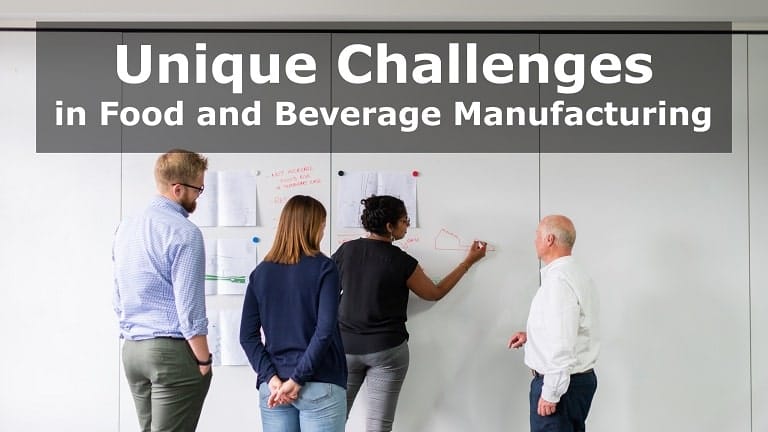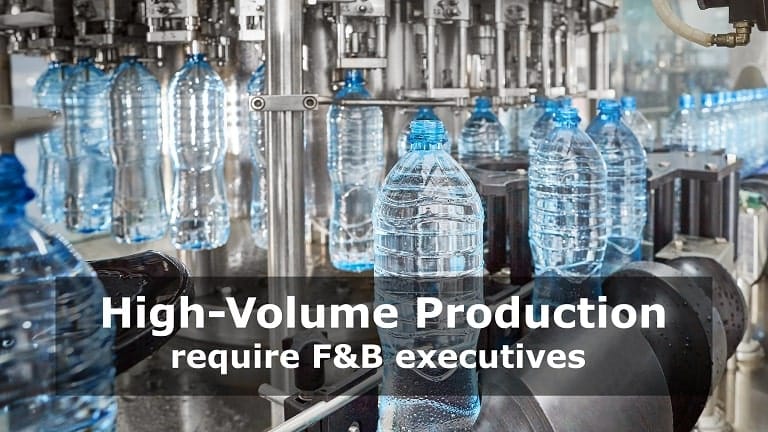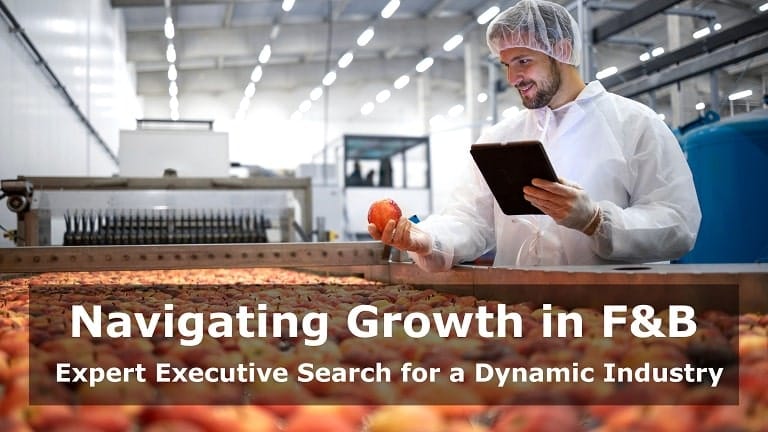The food and beverage (F&B) manufacturing industry operates at an intense pace, driven by high consumer demand, tight margins, and ever-evolving trends. With pressures ranging from food safety regulations to shifting dietary preferences like plant-based eating and clean-label transparency, F&B companies face unique and complex challenges. In this dynamic environment, executive leadership is more critical than ever. The right leaders can drive operational efficiency, foster innovation, and navigate rapid market changes with confidence. But finding such talent requires more than just luck—it demands expertise. That’s why many companies turn to specialized food and beverage manufacturing recruiters to help identify, attract, and secure executive candidates who are built for the future of the industry.
Unique Challenges in Food and Beverage Manufacturing

The food and beverage (F&B) manufacturing sector is one of the most demanding and fast-moving industries in today’s global market. From ensuring large-scale production to meeting safety regulations, companies must constantly balance quality, efficiency, and profitability. At the heart of navigating these pressures lies a major challenge: finding the right executive talent capable of leading in this high-stakes environment.
One of the biggest hurdles is the high-volume nature of production. Consumers demand consistent availability of food and beverage products, pushing manufacturers to operate around the clock. This scale requires leaders who can streamline operations, reduce waste, and optimize throughput without compromising on quality.
Compounding this pressure are low profit margins and intense competition. A few cents can make or break profitability. With commodity prices fluctuating and retailers pushing for lower prices, executives must have sharp financial acumen and the ability to drive cost efficiencies while maintaining product appeal.
Additionally, food safety regulations like HACCP (Hazard Analysis Critical Control Point) and the FSMA (Food Safety Modernization Act) demand strict compliance. Failing to adhere to these can lead to recalls, legal issues, and damage to brand reputation. As a result, leadership must not only be operationally sound but also deeply familiar with compliance protocols and risk management.
The sector also faces increasing supply chain complexities—from sourcing raw ingredients globally to managing perishable inventories. Global events, labor shortages, and transportation delays have further exposed vulnerabilities. Executives must be agile problem-solvers, capable of building resilient, responsive supply chains.
All these challenges are interconnected and can only be successfully managed with the right leadership at the helm. Strategic decisions on automation, vendor partnerships, lean manufacturing, and product innovation stem directly from the C-suite. That’s why companies are increasingly turning to specialized food and beverage manufacturing recruiters to find leaders who can operate under pressure, think ahead of the curve, and turn challenges into growth opportunities. The right executive can be the difference between surviving and thriving in this competitive industry.

Rapidly Shifting Consumer Trends and Innovation
The food and beverage (F&B) industry is in the midst of a major transformation, driven by rapidly evolving consumer expectations. Today’s shoppers are not just focused on taste or price—they’re looking for products that align with their values, lifestyles, and health goals. This shift has led to a surge in demand for plant-based products, clean labels, and sustainable sourcing. Consumers want transparency: fewer ingredients, minimal processing, and environmentally responsible practices. These trends aren’t passing fads—they’re reshaping how products are formulated, packaged, and marketed.
Compounding this challenge is the shortening of product lifecycles. What’s trending today may be outdated in a matter of months. F&B companies are under pressure to bring new products to market quickly, requiring streamlined R&D, agile production, and rapid feedback loops. Traditional approaches no longer work—brands must move fast to remain relevant.
Additionally, the rise of digitalization and e-commerce has disrupted how consumers discover and purchase food. From online grocery platforms to direct-to-consumer models, digital channels now influence buying behavior and brand loyalty. Social media, influencers, and data-driven personalization have become powerful tools in shaping purchasing decisions.
To keep pace, companies need forward-thinking executives who are not just aware of these trends—but are equipped to lead through them. These leaders must be innovative, digitally savvy, and deeply in tune with consumer behavior. That’s why organizations increasingly rely on specialized food and beverage manufacturing recruiters to find executives who can transform challenges into competitive advantages and drive innovation at every level.
What Makes a Great F&B Executive Today?
In today’s fast-evolving food and beverage (F&B) manufacturing sector, the definition of an exceptional executive has changed significantly. It’s no longer just about operational experience—it’s about vision, agility, and innovation. The best F&B leaders are those who can adapt to rapid shifts in the market while ensuring the organization stays competitive and compliant.
Agility and adaptability are top traits. With changing consumer preferences, supply chain disruptions, and tightening food safety regulations (like HACCP and FSMA), executives must pivot quickly and make informed decisions under pressure. Static leadership simply won’t work in an environment that rewards speed and responsiveness.
Modern F&B executives must also possess cross-functional knowledge. They need to understand not just manufacturing operations but also how supply chains, marketing strategies, regulatory compliance, and retail dynamics intersect. This broad perspective allows them to make decisions that align with both the bottom line and the brand’s long-term vision.
Innovation and openness to new technologies are equally critical. From automating production lines to using AI for consumer trend analysis, forward-thinking leaders embrace digital tools to improve efficiency and fuel growth.
Finally, great F&B executives have a solid grasp of the retail and consumer landscape. As direct-to-consumer models and e-commerce platforms gain momentum, leaders must think like marketers and understand how product experience influences brand loyalty.
According to a recent industry report by Deloitte, “F&B leaders who combine strategic insight with operational agility will define the future of the industry.” That’s exactly the kind of talent food and beverage manufacturing recruiters are helping companies secure.
The Role of Food and Beverage Manufacturing Recruiters
In a competitive and fast-paced industry like food and beverage (F&B) manufacturing, hiring the right executive can make or break a company’s success. That’s where food and beverage manufacturing recruiters step in as strategic partners. These specialized recruiters bring deep industry knowledge and a focused understanding of what it takes to lead in this high-stakes sector, making them invaluable in the search for top executive talent.
Unlike general recruiters, F&B recruiters understand the niche requirements of the industry. They are well-versed in key operational challenges—such as high-volume output, strict food safety standards (HACCP, FSMA), and tight margins—and know how these factors influence leadership styles and decision-making. Their expertise enables them to identify candidates who are not only qualified on paper but also aligned with the complex realities of F&B operations.
Beyond technical qualifications, great recruiters focus on leadership fit. This includes assessing a candidate’s cultural alignment with the organization, their ability to drive innovation, and their experience navigating change. For example, in an industry driven by shifting consumer preferences and retail dynamics, recruiters seek executives who have a proven track record in areas like product innovation, sustainability initiatives, and digital transformation.
Speed and discretion are critical in executive hiring. Delays in filling a key leadership role can disrupt operations, delay product launches, or impact investor confidence. At the same time, confidentiality is essential—especially when recruiting for roles that involve succession planning or replacing existing leadership. F&B recruiters excel in managing this delicate balance, ensuring that hiring is handled swiftly, discreetly, and professionally.
Finally, the true strength of F&B recruiters lies in their industry networks and long-standing relationships. They maintain curated talent pools of passive candidates—high-caliber professionals who aren’t actively job hunting but may be open to the right opportunity. These relationships often give companies access to leaders they wouldn’t reach through traditional hiring methods.
In essence, food and beverage manufacturing recruiters serve as a bridge between specialized talent and the evolving demands of the industry—ensuring companies stay competitive with leaders who can drive growth, compliance, and innovation.
Partnering with the Right Executive Search Firm
Finding the right executive talent in the food and beverage (F&B) manufacturing sector requires more than just scanning resumes—it demands a strategic partnership with an executive search firm that understands the unique dynamics of the industry. From evolving consumer trends to strict regulatory environments, the F&B space is complex, and aligning with the right recruiting partner can be a game-changer.
The first step in selecting the right firm is to look for specialization in food and beverage manufacturing. Generalist firms may not fully grasp the nuances of HACCP, FSMA compliance, supply chain constraints, or the importance of innovation in a plant-based and clean-label-driven market. Recruiters with deep industry expertise are better equipped to identify executives who can lead confidently within these parameters.
It’s also essential to evaluate the firm’s understanding of both regulatory requirements and consumer demands. The ideal recruiter should be familiar with the pressures of food safety, traceability, and sustainability, as well as the speed at which trends like plant-based diets, functional foods, and e-commerce are reshaping the industry. They must be able to source candidates who are not only compliant-minded but also agile and consumer-focused.
Another key consideration is the firm’s track record of successful leadership placements. Ask for case studies or examples of prior executive hires in similar companies or roles. Firms that consistently deliver strong leadership matches can help minimize hiring risk and reduce the time to productivity for new executives.
Finally, partnering with an executive search firm should be viewed as a long-term relationship, not just a transactional engagement. As your business evolves—whether expanding into new markets, launching new product lines, or restructuring operations—a dedicated search partner will already understand your business goals, culture, and leadership needs. This continuity allows for faster, more accurate placements in the future and builds a stronger leadership pipeline.
In a competitive hiring landscape, partnering with the right F&B-focused executive search firm isn’t just smart—it’s essential for sustained growth and innovation.
Conclusion
In an industry defined by speed, compliance, and consumer-driven transformation, the need for visionary leadership in food and beverage manufacturing has never been greater. From managing operational complexity to anticipating the next big trend, today’s executives must wear many hats—and wear them well. Partnering with experienced food and beverage manufacturing recruiters ensures that companies find leaders who are not only equipped for today’s challenges but prepared to shape tomorrow’s success. Discover how our executive recruitment expertise in manufacturing can empower your business for sustainable growth. The future belongs to those who lead it—and it all begins with the right hire.


